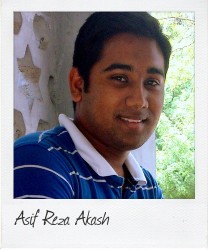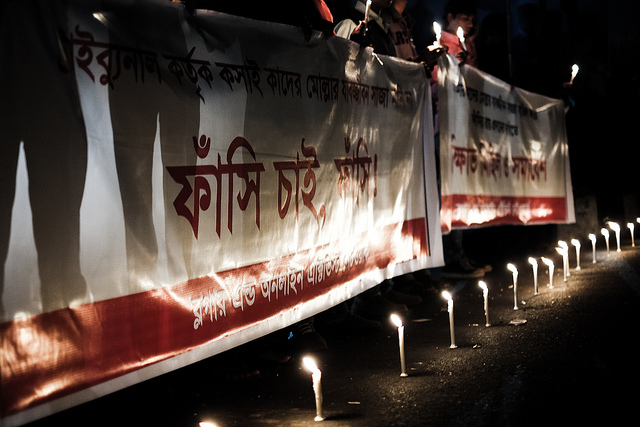"Crimes against humanity: trial in Bangladesh"
November 21st, 2014 Long after a gruesome war of independence, alleged war crimes are going to trial in Bangladesh. Asif Reza Akash, 22, a Correspondent from Dhaka in Bangladesh, argues that the legal process is necessary to bring justice.
Long after a gruesome war of independence, alleged war crimes are going to trial in Bangladesh. Asif Reza Akash, 22, a Correspondent from Dhaka in Bangladesh, argues that the legal process is necessary to bring justice.
A maxim says justice delayed is justice denied. But Bangladesh has initiated a long-awaited trial of alleged crimes against humanity dating back to 1971.
In that year Bangladesh got independence from Pakistan after a gory liberation war. Three million people were killed and 0.2 million women were raped and mutilated by the Pakistani occupation forces throughout the nine months of war. That was perhaps the worst genocide the world had ever seen. London Times, in 1971, reported that, “If blood is the price of independence, then Bangladesh has paid the highest price in history.”
A political party named Jamaat-e-islami along with some others did not want an independent Bangladesh and when the war started they explicitly supported Pakistan and assisted the occupation army by being their auxiliary force. It participated in killing, loot, rape, torture, arson, abduction and so many terrible crimes in cold blood. Jamaat’s student wing, Islami Chatra Shangha, worked as a militia force at that juncture. All the mentioned activities of Jamaat are facts and substantiated by history.
However, Bangladesh won independence and immediately after that the trial of the accused war criminals was postponed and the party was banned from politics. After a decade of dormancy, the party rose again, started its activities, and the infamous leaders of 1971 became the top brass of the party. They made an alliance with a major political party of Bangladesh and unbelievably two of them became ministers in the cabinet. Within this time, the party gathered followers by using Islam as a political tool. They strengthened their base by founding many financial and educational institutions, hospitals and other profitable companies. They tried their level best to alter the history, to make people forget what they did in 1971, but never admitted their wrongs and never apologized.
In 2008 when the pro-liberation force of 1971, Awami League, came to power with a landslide victory in the polls, they set up The International Crimes Tribunal (ICT) in 2009 to investigate and prosecute suspects for the genocide and atrocities committed in 1971 by the Pakistan Army and their local collaborators during the Bangladesh Liberation War. Later, all the accused party men of Jamaat were arrested by the order of ICT and faced the charges of crimes against humanity. The whole matter had been getting coverage by all types of media at home and abroad. In this time, several debates came to light about the standards of the proceedings, but the judicial process advanced.
After year-long investigations, arguments and judicial proceedings the ICT started to offer verdicts against the accused criminals. Verdicts and relevant documents were published and covered by the print media and TV. Some of those convicted got the death penalty and some were sentenced to life in prison. The trial is still in progress. At this time, only one death penalty has been carried out by the government, while some of the accused died in prison due to old age. Recently, two more accused were awarded capital punishment.
The whole nation has welcomed the judgement but Jamaat called strikes and created terror country-wide. This money-rich party allegedly tried to influence the trial by making liaisons with foreign governments. They are said to have hired professional lobbyists to pressure the incumbent government of Bangladesh. In many countries the death penalty is not allowed, rather life imprisonment is the ultimate sentence. Many foreign governments criticized the sentence from their views but did not disagree with the continuation of the trial for the heinous allegations.
The trial is a landmark in the history of the Bangladesh and the world. When a crime goes unpunished, the world becomes unbalanced. This trial will erase the stigma from our history.
Lastly, from my perspective, we are lucky to see the justice in our youth. We have learned the history of our liberation and sacrifice from our fathers, and now we can do the same in the future to our children. We heard the stories of crimes, and we will tell the stories of punishment and justice. It is not revenge, not even retribution. It is justice.
photo credit: M. Hasan via photopin cc
………………………………………………………………………………………………………………
About me: I am a postgraduate student of Accounting & Information Systems at University of Dhaka in Bangladesh, with a bachelors from the same school. I write articles on contemporary socio-economic and political issues for English dailies in Bangladesh. Politics, economics and energy are three of my interests. Movies, music, books and hanging out with friends are my pursuits. I dream of traveling the world and exploring different cultures.
Find me on Twitter @asifrezaakash and read my blog at www.asifreza.blogspot.com
………………………………………………………………………………………………………………
Opinions expressed in this article are those of the author and do not necessarily represent the views of the Commonwealth Youth Programme. Articles are published in a spirit of dialogue, respect and understanding. If you disagree, why not submit a response?
To learn more about becoming a Commonwealth Correspondent please visit:
http://www.yourcommonwealth.org/submit-articles/commonwealthcorrespondents/
………………………………………………………………………………………………………………






